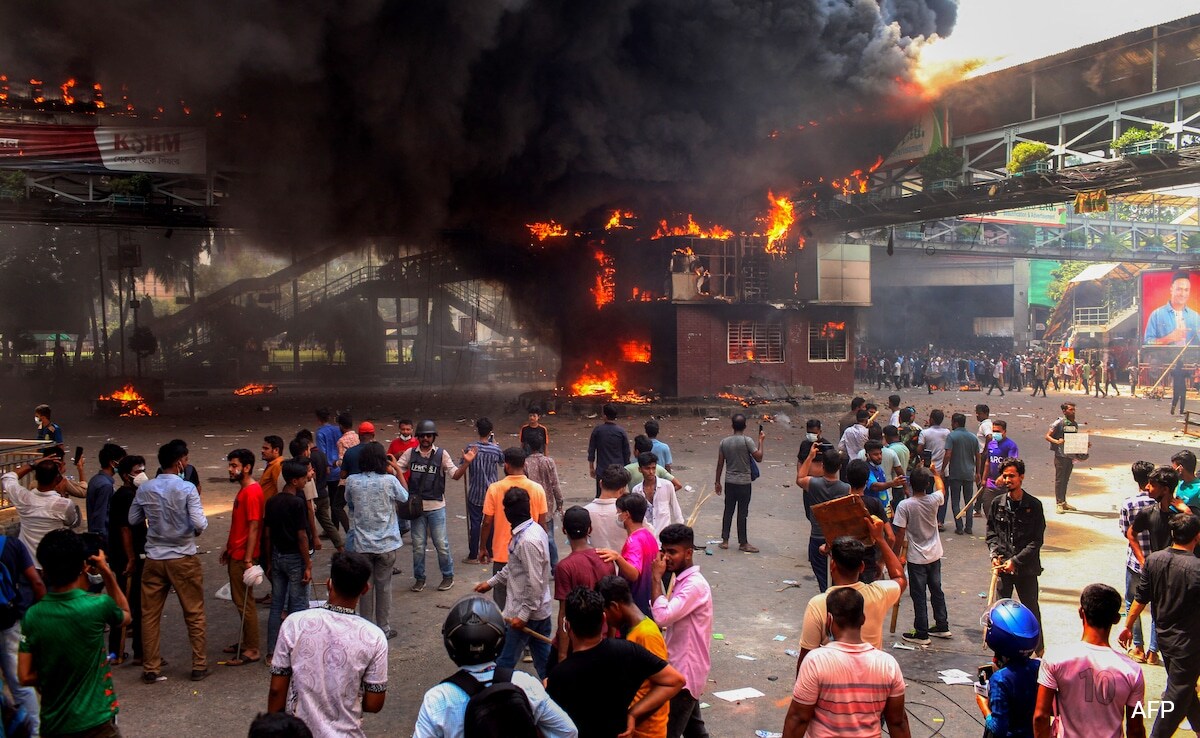At least 163 people killed in clashes in Bangladesh (File)
The Bangladeshi student group that led demonstrations that turned into deadly violence suspended protests for 48 hours on Monday, with its leader saying they did not want reforms “at the cost of so much blood.”
What started as demonstrations against politicized admission quotas for sought-after government jobs turned into one of the worst unrests of Prime Minister Sheikh Hasina’s tenure.
A curfew has been imposed and soldiers are patrolling cities in the South Asian country, while a nationwide internet outage since Thursday has drastically limited the flow of information to the outside world.
“We are suspending the shutdown protests for 48 hours,” Nahid Islam, the top leader of main protest organizer Students Against Discrimination, told AFP from his hospital bed.
He was treated for injuries after being beaten by people he accused of being undercover officers, he said.
“We demand that the government lift the curfew during this period, restore the internet and stop attacking the student protesters.”
On Sunday, the Supreme Court scaled back the number of reserved jobs for specific groups, including the descendants of “freedom fighters” from Bangladesh’s 1971 liberation war against Pakistan.
“We started this movement to reform the quota,” Islam said.
“But we did not want quota reform at the cost of so much blood, so much killing, so much damage to life and property.”
At least 163 people have been killed in clashes, including several police officers, according to an AFP tally of casualties reported by police and hospitals.
Sporadic violence continued on Monday, with four people taken to Dhaka Medical College Hospital with bullet wounds, an AFP reporter at the scene saw.
Government officials have repeatedly blamed protesters and opposition for the unrest.
Dhaka Metropolitan Police spokesman Faruk Hossain told AFP that “at least 532” people have been arrested in the capital since the protests began, including some leaders of the opposition Bangladesh National Party.
Ali Riaz, a politics professor and leading Bangladesh expert at Illinois State University, described the violence as “the worst massacre by any regime since independence.”
“The atrocities committed in recent days show that the regime is completely dependent on brute force and has no regard for the lives of the people,” he told AFP.
“These indiscriminate killings cannot be taken away by a court ruling or government announcement.”
Diplomatic questions
Bangladesh’s Nobel Peace Prize laureate Muhammad Yunus called on world leaders and the United Nations to do everything in their power to end the violence.
“There must be an investigation into the killings that have already taken place,” the 83-year-old said in a statement, his first public comments since the unrest began.
The respected economist is credited with saving millions from poverty with his pioneering microfinance bank, but earned the enmity of Hasina, who accused him of “sucking blood” from the poor.
“Bangladesh is embroiled in a crisis that seems to be getting worse by the day,” Yunus said. “High school students are among the victims.”
Diplomats in Dhaka questioned Bangladeshi authorities’ deadly response to the protests.
Foreign Minister Hasan Mahmud summoned ambassadors for a briefing on Sunday and showed them a 15-minute video that sources said focused on the damage caused by protesters.
US Ambassador Peter Haas told Mahmud he was presenting a one-sided version of events, a senior diplomatic official said.
“I’m surprised you haven’t shown images of police shooting unarmed protesters,” the source quoted Haas telling the minister.
A US embassy official, speaking on condition of anonymity, confirmed the ambassador’s comments.
The diplomatic source added that Mahmud did not respond to a question from a UN representative about the alleged use of UN-marked armored personnel carriers and helicopters to suppress the protests.
Bangladesh is a major contributor to UN peacekeeping operations around the world – generating significant revenue from its efforts – and has UN-marked equipment in its military inventories.
Quota for ‘Freedom Fighters’
With around 18 million youth unemployed in Bangladesh, according to government figures, the reintroduction of the quota scheme has severely upset graduates facing an acute job crisis.
The Supreme Court ruling limited the number of reserved jobs from 56 percent of all positions to seven percent, most of which will still be reserved for the children and grandchildren of “freedom fighters” from the 1971 war.
Although 93 percent of jobs will be awarded on the basis of merit, the decision fell short of protesters’ demands to remove the “freedom fighter” category altogether.
Critics say the quota is being used to stack public jobs with loyalists of Hasina’s ruling Awami League.
Opponents accuse her government of bending the judiciary to her will.
Hasina, 76, has ruled the country since 2009 and won her fourth straight election in January in a vote without real opposition.
Her government is also accused by rights groups of abusing state institutions to tighten its grip on power and stamp out dissent, including through the extrajudicial killing of opposition activists.
(Except for the headline, this story has not been edited by NDTV staff and is published from a syndicated feed.)














